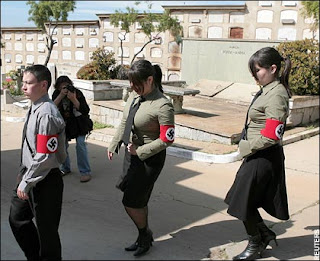THE ELEPHANTS IN THE ROOM
Lenin is right on several counts in his reporting of the London elections:
(a) Yesterday’s Love Music Hate Racism was a great success, despite the rain and the ban against bringing cans of lager in with you. The turnout was terrific (100,000 according to the organisers), the toilets were pretty damn fine (nobody endured a sub-5/10 ablution), Poly Styrene played “Oh bondage up yours!”, and we were treated to an apocalyptic, dubsteppin’ finale of “Ghost Town” by Jerry Dammers, his orchestra and Spaceape.
(b) For all the predictions that the fascists will secure the 5% share they need to win seats on the Assembly, Nazis are a rarity in London. The BNP is a rising force because it is given a diet of rising poverty, insecure housing, and scapegoating of the Other to feast on. Most people will not vote BNP because they are endemic racists (see here for a similar situation in a different continent), but because they feel scared, betrayed and are crying out for an alternative.
(c) Ken looks more vulnerable than he has done in his political career. He has fought a defensive, apolitical campaign, and has not been in a position to rebut the Standard’s slew of slurs with his usual brash confidence. In a Livingstone-vs-Gilligan punch-up, Ken should floor that most unprincipled of hacks every time – in fact, his own nose has been bloodied.
(d) Although Ken should get the vote of everybody whose skin crawls at the thought of the Tories getting in, only Lindsey German has consistently pointed to the elephants in the room: the war and its far-reaching effects at home, privatisation of transport and health, the yawning gap between rich and poor, and most of all....
...HOUSING.
Public / affordable housing is the biggest elephant in the room for people who live in poverty, or who live with serious disabilities or illnesses. Across the capital, council housing stock decreases while need increases. An increasing dependence on low-paid workers (especially labour imported from abroad) means that more and more people will need cheap, decent housing to rent. Where will it come from?
Three north London Boroughs that I can think of are grappling with this problem.
One took the option, some time ago, of transferring most of its stock into private hands. This remains the ideal option of most Conservative and Lib Dem local authorities (and some Labour ones), though they are too aware of tenant opposition to actually go through with it. In this particular Borough, it was a disaster.
Another Borough has a chronic (and historic) shortage of Council housing, and a lack of capital to invest into existing stock. Some years back, its tenants refused to comply with the government’s edict that housing management should be outsourced, so the government withdrew the funding needed to bring its homes up to a decent standard. It is now in the process of auctioning off hundreds of street properties to raise the necessary cash. Meanwhile, some of the most vulnerable people in the Borough, including those with severe mental illnesses and high risks of relapse, are being placed in shoebox-size flats owned by private-sector landlords who are either rank profiteers, or well-meaning people utterly unprepared for the challenges of providing housing to tenants with complex needs.
The third local authority gives people with mental health problems much higher priority than the second. Its housing shortage is also less acute, and its market rates for private-sector rents are lower. Nevertheless, the concentration of unwell, poor and socially excluded people on estates grows with every year that passes. As with any other Housing Register in inner London, new tenants will usually have extremely high health or social care needs; it seems like a given that “sink estates” will soon abound in this Borough as a result of short-sighted housing policies.
Three different options, all heading down a slippery slope - and why? Because the supply of social housing continues to fall behind demand. Cheaper rents in the private sector are not enough. Only public housing provides a combination of decent accommodation, security of tenure, affordability of rent and accountability of provision. There are more than a million and a half people on waiting lists for Council housing. While local government struggles for the most painlessly pragmatic concessions, the big question remains unanswered at the centre: what more evidence is needed before a nationwide programme of public housing is passed?




